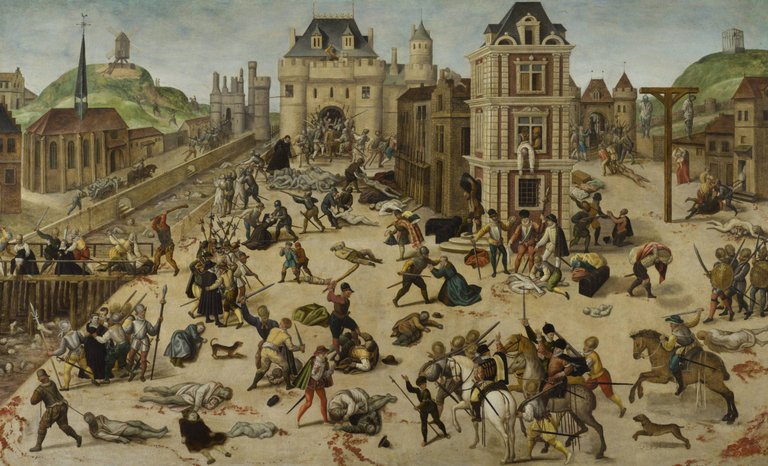When Civilizations Fall: Kuyper’s Call to Gospel Reformation
It took me more than a month to continue my planned series of articles about Abraham Kuyper's sixth lecture, Calvinism and the Future. I wrote the introduction last 04 April and concluded the article with a description of the consensus of social diagnosis among intellectuals about the prevalent moral decay of the modern age.
From where I left off, I would like to write this second article covering pages 173 to 180. In these eight pages, Kuyper answered two important questions:
Is there a way for us to recover from the moral decay that characterizes the modern age?
What brought the modern age into this rotten condition?
Historical Evolution or a New Reformation?
Responding to the first question, Kuyper gave two examples from history. The first example identified ancient civilizations like India, Babylon, Egypt, Persia, and China. If Kuyper is accurate, he claims that the decline of these ancient civilizations did not lead to higher moral or spiritual renewal.
The second example is a historical exception. What saved the Roman Empire from ruin was not natural evolution, but the Gospel of the Lord Jesus Christ. The same process was repeated during the medieval period. Again, at that time, theological ignorance was widespread, as well as moral and spiritual decline. At the close of the Middle Ages, the social crisis in Europe found an antidote not from historical evolution but from the same Gospel that saved the ancient society.
From these two examples in history, we could say that spiritual renewal does not emerge naturally from decay but through divine revelation and the transformative power of the Gospel. Yes, some influential personalities in history indeed attempted to act as redeemers or bring about renewal, but such movements cannot replace the unique position of the Son of God, the Savior of mankind. Even speculations about a new “universal spirit” to revive civilization are nothing and dismissed by Kuyper as idle fantasies.
In the modern age, instead of looking for messiahs to save us from both spiritual and moral decay, Kuyper believes that the only hope lies in the same Gospel that saved human civilization twice in the past.
After affirming his confidence in the Gospel of Christ, Kuyper identified one distinction between the modern era and the two preceding civilizations, and that is the absence of receptivity to the Gospel. Both hostility among the elites and indifference among the masses are growing. Modern philosophy sees itself as having outgrown the Gospel, considering it suitable only for young children and the primitive.
What Brought the Modern Age to the State of Decay?
Abraham Kuyper traces the roots of the current spiritual and moral bankruptcy of the modern age to the late 18th-century Enlightenment and the French Revolution. However, he did not exempt the Christian Church for her complacency and withdrawal from the wider scope of human life and culture. Such negligence opened the door for deists and atheists to gain widespread influence. Again, the French Revolution of 1789 was cited as an example of man's emancipation from God. Kuyper here mentioned an interesting but almost forgotten piece of history - the St. Bartholomew's Day massacre of the Huguenots on August 24, 1572. In the mind of Kuyper, the French Revolution of 1789, while it brought some measure of justice, avenging the death of Protestants, ultimately undermined ethical and spiritual stability in the country.

Nevertheless, though the Revolution still clung to the Calvinistic ideals of liberty, their chosen means was violence rather than spiritual transformation. The Revolution’s rejection of divine revelation resulted in individuals becoming their gods, accountable only to themselves. This led to chaos. France, once the birthplace of high ideals, in Kuyper's time had descended into moral and social ruin: family breakdown, sexual immorality, political corruption, and national decline.
The influence of the ideas behind the French Revolution spread across Europe, especially through corrupt literature. German intellectuals, recognizing France’s moral failure, tried to preserve the idea of emancipation from God in a more orderly form. Philosophers proposed systems grounded in natural law or pantheism, giving the illusion of stability. Yet, these systems could not ultimately sustain ethical life, and even in Germany, moral foundations weakened. Though differing from France in form, both rejected Christianity and embraced secularism. The radical atheism of Voltaire gave way to the even more blasphemous Nietzsche, whose work gained popularity among German youth.
Such is the background of modern life that brought us into this current state of spiritual and moral decline. A decisive break from Christian tradition, modern thought denies creation and sees humanity as a product of evolution.
This leads to two modes of life: one refined and intellectual, the other materialistic and hedonistic, especially among urban masses. In both cases, there is a common rejection of fixed moral principles. Conscience grows dim and idealism fades.
Money, pleasure, and social power, these alone are the objects of pursuit; and people are constantly growing less fastidious regarding the means employed to secure them (p.179).
Moreover, marriage weakens, monogamy is dismissed, and suicide and insanity rise with life’s increasing burdens. Society descends into moral anarchy, and the spiritual fire that once sustained civilizations has become a fading flame.
In short, Kuyper, in the mentioned eight pages, argues that if we rely on natural evolutionary processes, history tells us that there is no hope for spiritual and moral renewal for the modern age. Only a return to the old yet ever-new Gospel can redeem a civilization on the brink of destruction.
Grace and peace!
Posted Using INLEO

https://x.com/jewellery_all/status/1925814223516450927
#hive
https://x.com/lee19389/status/1925678951042580486
#hive #posh